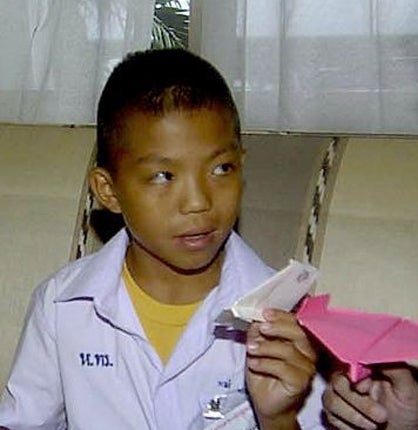Origami champion, 12, captures Thai hearts
Prime Minister tells boy with refugee parents that he can travel to Japan

When it came to folding paper into planes, 12-year-old Mong Thongdee lacked nothing.
Such was his dexterity, such was his sheer art, that he won a national origami championship in Thailand having made a plane that flew for a full 12 seconds. He was even reckoned good enough to be invited to compete in an international contest later this month in Japan.
But what Mong did not have was Thai citizenship. Although he was born in the south-east Asian nation, his parents were migrant workers from neighbouring Burma and as such, under the country’s laws, he was not considered a citizen and did not possess a passport. When he was refused permission to travel to Japan, he wept in front of the television cameras - triggering an outpouring of national sympathy. “I really want to go because I have been practicing hard, but I know the adults say I can't go because I have no citizenship,” he sobbed.
Now, after a meeting with Thailand’s prime minister, a special exception has been made for Mong. The foreign ministry spokesman said that following a promise that prime minister Abhisit Vejjajiva personally made to the paper-folding champion, the youngster will be granted temporary papers that are valid for one journey.
Wongsak Sawaspanich, a ministry official in charge of the case, said the decision to issue the papers had been made on “legal and humanitarian grounds”. He rejected speculation that officials had caved in to public pressure, having initially said that allowing the boy to leave and return would present a threat to national security.
Either way, the story of Mong’s struggle to travel to Japan and represent the country in which he was born, has drawn attention to the plight of around 500,000 stateless people living in Thailand who legally cannot leave and return to the country.
The boy’s parents are ethnic Shan, who - like so many others - fled from Burma to avoid persecution from the military junta and to seek a better life. There are hundreds of thousands of such people scattered in refugee camps that dot the border between the two countries. While his parents have temporary permission to live and work in Thailand, if he had left and tried to return his status would be revoked and he would be barred entry.
Jackie Pollock, a British aid worker who founded the MAP Foundation, a Thailand-based charity that works with displaced people, said stories like that of Mong were not uncommon. “This is the situation that many children are in,” she said, speaking from the northern town of Chiang Mai, where Mong and his parents live. “There are many migrants and the Thai government does not recognise them as refugees. I think they were worried that if they [granted a passport to Mong] it would set a precedent.”
Campaigners are hopeful that Mong’s case, which saw the Lawyers Council of Thailand petition the authorities on his behalf, may encourage the authorities to do more. After meeting with the boy at the parliament building in Bangkok, Mr Abhisit acknowledged the problem of stateless people and pledged to task the national security council with improving their access to education and health care.
Join our commenting forum
Join thought-provoking conversations, follow other Independent readers and see their replies
Comments
Bookmark popover
Removed from bookmarks